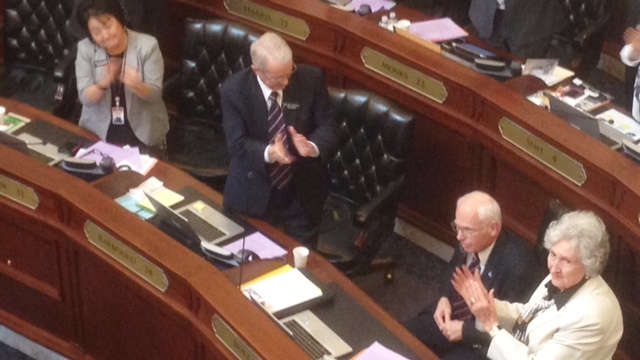A 74-day legislative session. A $1.37 billion K-12 budget. And, in 61 days, a primary election.
But first things first. If you have questions about what happened on the K-12 front during the 2014 legislative session, we have some answers here.
Will teachers get a pay raise? Prospects look good. Teachers and administrators are in line for a 1 percent pay increase, as part of the 2014-15 K-12 budget. That’s a piece of the K-12 budget package headed to Gov. Butch Otter.
Teachers could also share in $15.8 million of leadership “premiums.” The premium is a one-time boost, ranging from $850 to $5,780. It’s designed for teachers who mentor their peers, take on multiple topics, take hard-to-fill teaching jobs, or fill other leadership roles.
How will starting teachers fare? The K-12 budget boosts the minimum teaching salary from $31,000 to $31,750.

Will my school district get a post-recession boost? Yes. The K-12 budget reflects a 5.1 percent increase, and $35 million of the increase comes in school district “operational funding.” Formerly dubbed “discretionary” spending, these dollars can be used for a variety of functions, such as utility bills, transportation costs and health insurance. But the state has a ways to go to make the schools whole again. The state slashed $82.5 million in operational funds during the recession — and when growth is factored into the equation, it will now take $113 million to cover the cuts.
What’s the future for broadband in my local high school? The beleaguered Idaho Education Network broadband system will remain online through the end of this school year, and at least for the first few months of the 2014-15 school year. A $4.8 million bailout will keep the system funded, and in place, until lawmakers can convene for the 2015 session.
Will the broadband budget mess be resolved when lawmakers return to town next year? Or will the Idaho Education Network remain embroiled in a lawsuit and a fight over federally administered funding? No easy answers there. No one seems to know when this issue might be resolved, or how.
And what about WiFi in high schools? The state will still pay to hook up WiFi in high schools and junior high schools. But there’s a twist, imposed by lawmakers who are still sore over the multiyear WiFi contract signed by state superintendent Tom Luna last July. School districts will be able to opt out of the state system, or install their own, and receive state funding worth $21 per student.
What will happen with Schoolnet? Districts can continue to use the system — which is designed to give teachers real-time access to student performance data, but has been beset by glitches. Or districts can go another route. The state will provide districts with $2 million to install the instructional management system of their choice.
Will my local school get a shot at some technology money? There will be $3 million up for grabs. The K-12 budget earmarks money for another round of technology pilot grants. But expect the competition to be fierce. A year ago, 81 schools applied for money, and only 11 shared the cash.
What happened with the Common Core assessment? A field test of the test will go on as planned. But the Legislature voted to create a 30-person committee to review Smarter Balanced Assessment Consortium questions “for bias and sensitivity.”
What’s the prognosis for state-funded pre-K? You’ll have to wait a year. A bill establishing five pilot pre-K programs statewide received preliminary approval from the House Education Committee, but that was the extent of it. Rep. Hy Kloc, D-Boise, is already hoping to come back with another bill in 2015.
What became of the parental rights bill? House Bill 567 asserted that parents have “a right, responsibility and obligation to participate” in their kids’ education. It easily passed the House but was held in the Senate Education Committee.
Any changes in teacher and administrator evaluations? Not from the 2014 session. House Bill 556 would have given a say to parents and students — perhaps even grade-schoolers and kindergartners. Education stakeholder groups vehemently opposed the bill. The House narrowly passed the bill. Senate Education Chairman John Goedde held the bill in committee.
Can I get a tax break for scholarship donations? No. House Bill 507 would have allowed individuals and businesses to collect $10 million in tax credits for donating to private school scholarship funds. In essence, it was a repeat of 2013; the tax credit bill passed the House but went nowhere in the Senate. Education stakeholders unanimously opposed the bill, and critics contend it is an unconstitutional voucher plan.

Disclosure: Schoolnet was funded with a startup grant from the J.A. and Kathryn Albertson Foundation, which also funds Idaho Education News.
